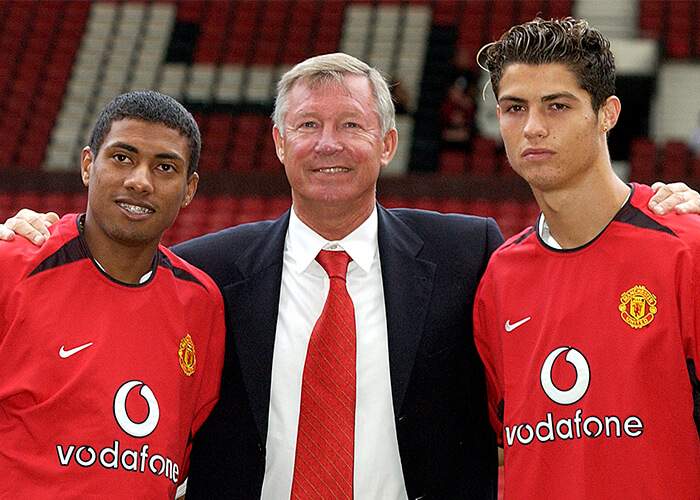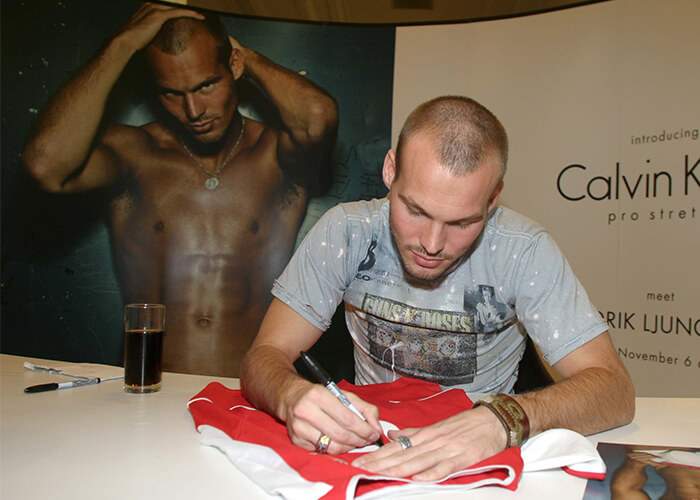The Premier League is 25 years old on 15 August 2017.
To mark the anniversary, BBC Sport has produced five pieces, each covering a five-year period in the competition's history.
This is the third piece, focusing on the span from 2002-03 to the end of the 2006-07 campaign.
Scroll down for written insight, a visual timeline, Mark Lawrenson's team of the era, a tailored tactics board and tables, before testing yourself with our Merlin sticker quiz.
Sometimes you can see the future coming.
When Wayne Rooney scored his first league goal for Everton in October 2002, 16 years old and 30 yards out against England’s long-time goalkeeper, you didn’t need to be told to remember the name.
Less than two years later, his country’s most exciting player at their most recent major championship disappointment, the teenager signed for the Premier League’s most successful club for a record-breaking transfer fee. What fewer envisaged was that it would be three more years until the combination yielded another title.
After United won their eighth Premier League in 11 seasons in 2003, Alex Ferguson decided it was time for one of his periodic rebuilding-from-the-top summers. So it was that David Beckham got his Galactico move to Spain, World Cup winner Fabien Barthez would be lobbed no more and the criminally underwhelming Juan Sebastian Veron was palmed off on Chelsea.
In their place came a series of flops – David Bellion for £2m, Eric Djemba-Djemba for £3.5m, Brazilian midfielder Kleberson for £6m – and one uncut diamond, the 18-year-old Cristiano Ronaldo.

Cristiano Ronaldo (right) and Kleberson (left) - one would go on to become a Manchester United legend. The other would not
His £12.24m price-tag, slightly less than Ferguson would shortly afterwards pay for Louis Saha, would prove arguably the greatest bargain in the league’s burgeoning history. That it was almost an afterthought at the time was because Veron was just a small part of the £110m that Chelsea would spend following their takeover from the brink of bankruptcy under Ken Bates by unknown Russian oligarch Roman Abramovich.
What do you buy the shy billionaire who has everything? Glen Johnson at right-back and Scott Parker to sit on the bench, it would transpire.
They also bought a striker in Adrian Mutu who would score four goals in his first three matches and end up, after a positive test for cocaine and a series of court cases, owing his new club £17m in damages.
Hernan Crespo was another of those trophy buys to promise more than he would eventually deliver, his 12 goals in his first season dwindling into loans back to Italy and a second coming at Stamford Bridge that few noticed. In the background were those who would really bring back the silverware - Claude Makelele for £16m, Damien Duff for £17m, Joe Cole joining his old West Ham team-mate and friend Frank Lampard for £6.6m.
It would take time and a new manager in place of Claudio Ranieri to make the blend work. Meanwhile at Arsenal, Arsene Wenger cooked up the Invincibles, the first team to win the top flight unbeaten since Preston 115 years before, led in stirring fashion by Thierry Henry, buttressed by the midfield assists and goals of Robert Pires and Freddie Ljungberg.
Ljungberg dyed his hair Gunners red and displayed his abdominal muscles in a series of commercials for Calvin Klein, and complained later that the ads led to him being groped in nightclubs. Neither scenario would have troubled his predecessor on the Arsenal flanks, Paul Merson, but Wenger’s finest team wasn’t all beauty and no beast: Pascal Cygan played a key supporting role in a remorseless defence, while the first of the manager’s summer signings had been Philippe Senderos, and his second Jens Lehmann.

Arsenal midfielder Freddie Ljungberg - full-time footballer, part-time model
It was a short-lived dynasty. In June 2004 Abramovich made his most important transfer move of all, bringing Porto manager Jose Mourinho to the club. Coaching would turn the former interpreter’s hair from black to grey, but not before the silverware had piled up, and fast: a first league title for Chelsea in 50 years, achieved with a record points tally and the fewest goals conceded yet.
Much of that first championship-winning team had been inherited – Lampard, Makelele, Duff, John Terry. The key additions under Mourinho came through the spine – Petr Cech, Ricardo Carvalho and the most important of all, Didier Drogba, who just a season before had been playing for a town of 7,000 people in the middle of the Brittany boondocks.
Supporters of rivals welcomed their own overseas investors with expectant arms, only to discover that a foreign passport and a heap of cash were no guarantee of success.
Randy Lerner at Aston Villa, Tom Hicks and George Gillett at Liverpool and Eggert Magnusson at West Ham all promised much and delivered less. Malcolm Glazer seldom spoke at all as he took over Manchester United, but the debt he brought with him would make the pips squeak.
Mourinho and Chelsea would repeat themselves in 2005-06 so everyone understood just how special they were.
Less-heralded clubs enjoyed their own relative surges – Bolton to sixth, Wigan to 10th, Reading to eighth – while others dawdled in their wake, Manchester City finishing 14th, 15th and 16th in the slump before their own storm.
The Premier League kept changing, even as its 15,000th goal was scored, even as no-one predicted it would be scored by Fulham defender Moritz Volz. By 2006 three of its clubs had shirts sponsored by internet betting companies, something which no-one would have put money on at its birth, the global reach of the competition illustrated by Everton advertising a beer from Thailand under its own Latin crest.
Ferguson, never likely to stand still and watch as Mourinho moved in, made the critical move in his team’s comeback by signing Nemanja Vidic and Patrice Evra within days of each other in January 2006.
Michael Carrick joined that summer, and with the kids Ronaldo and Rooney grown to men and producing 50 goals between them the following season, the title was once again back at Old Trafford.

19 October 2002: I think this kid’s got something! Everton striker Wayne Rooney becomes the youngest goalscorer in Premier League history with a last-minute winner against Arsenal, five days before his 17th birthday. Everton’s win ends the Gunners' 30-match unbeaten Premiership run.

2 July 2003: Chelsea are bought by billionaire Roman Abramovich in a deal worth £140m. The surprise takeover - the biggest in British football history - is finalised after talks with long-time Blues chairman Ken Bates. The club go on to spend £110m on 11 players by the end of the summer.

19 December 2003: Manchester United and England centre-back Rio Ferdinand receives an eight-month ban from football and a £50,000 fine for missing a drugs test on 22 September. He misses the rest of the season and Euro 2004. England players came close to striking for the crucial qualifier in Turkey in October after the Football Association left Ferdinand out of the squad.

15 May 2004: Arsenal, who had relinquished the title to Manchester United the previous season, complete the Premier League campaign unbeaten with a 2-1 win over Leicester as they reclaim the title. They are the first team to avoid losing a game in a league season since Preston in 1889.

2 June 2004: Jose Mourinho takes over as manager of Chelsea, replacing the sacked Claudio Ranieri. His news conference is legendary, during which he says: “Please don't call me arrogant because what I am saying is true. I am European champion. I think I am the special one.”

31 August 2004: After starring in England's run to the quarter-finals of Euro 2004, 18-year-old Wayne Rooney leaves Everton for Manchester United in a £27m deal - a world record for a teenager. He scores a hat-trick on his debut, in the Champions League.

24 October 2004: Arsenal's record streak of unbeaten top-flight league matches ends at 49 with a 2-0 away loss to Manchester United. The game is overshadowed by a post-match altercation which sees Sir Alex Ferguson hit by a slice of pizza.
28 February 2005: Norwich director and celebrity chef Delia Smith takes to the Carrow Road pitch at half-time during the game with Manchester City to rally the fans, telling them: "A message for the best football supporters in the world: we need a 12th man here. Where are you? Where are you? Let's be 'avin' you! Come on!" Norwich lose 3-2.

2 April 2005: In a Premier League match between Newcastle United and Aston Villa at St James' Park, Newcastle team-mates Lee Bowyer and Kieron Dyer are sent off for fighting each other. Bowyer is fined £200,000 by the club with captain Alan Shearer calling the incident “a disgrace”.

30 April 2005: Chelsea win their first top-flight title in 50 years, with a 2-0 victory over Bolton at the Reebok Stadium that gives them a still record points tally of 95. Frank Lampard, who would go on to score a record 211 goals for the club, gets both goals. Chelsea will claim the title again the following year.

12 May 2005: US sports tycoon Malcolm Glazer and his family win control of Manchester United in a £790m takeover. It is a move that splits opinion among fans, with many unhappy at the debt the new owners build up at the club. In the Glazers’ second full season in control, United reclaim the title from Chelsea.
22 October 2005: Arsenal pair Thierry Henry and Robert Pires make a mess of a penalty routine against Manchester City when the latter attempts to set up the former by tapping the ball to him from the spot. However, he scuffs his touch and instead concedes a free-kick. Fortunately for the French duo, the Gunners beat City 1-0.

4 February 2006: Alan Shearer becomes Newcastle United's top scorer of all time, netting his 201st goal for the club, against Portsmouth at St James' Park, beating Jackie Milburn's 200-goal tally which had stood for 49 years. He retires in April 2006 after scoring 206 times for the Magpies and 260 Premier League goals in total.
























